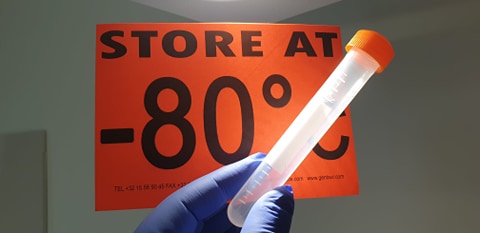When storing biological samples that we will later use in our research project, the selection of the most appropriate temperature to do so depends on factors such as the type of biological material, the solution in which it is suspended, the application of the sample or the expected storage time, among others.
In this post we bring you a summary of the most common storage temperatures for storing biological samples .
1.- STORAGE AT ROOM TEMPERATURE (15ºC / 27ºC)
Storage at room temperature has the advantage that the sample will be available for immediate use, and the costs and resources associated with the storage infrastructure are less than in the case of cold systems.
However, only some samples are suitable to be stored under these conditions. The biological samples that can be stored at room temperature include:
- Lyophilized samples.
- Paraffin-embedded fabrics.
- Saliva samples for genomic DNA studies with the appropriate preservative .
- Samples with preservatives that allow their stability at room temperature.
- Biological fluids for short periods of time from their obtaining (2-4h).
2.- REFRIGERATION (4ºC / 8ºC)
Refrigeration of biological samples is a good solution for short-term storage of samples that are stable at temperatures between 4 and 8ºC.
They can be stored refrigerated:
- Biological reagents such as enzymes or antibodies that are used frequently.
- Biological liquids previously centrifuged, up to a maximum of 24h.
3.- FREEZING (-20ºC)
Freezing is the technique of choice for storing biological samples for short periods of time, in those cases where they are not stable at higher temperatures.
They are usually stored at -20ºC:
- Nucleic acids (DNA / RNA).
- Plasma samples, up to a maximum of 4 weeks.
- Aliquoted biological reagents that are expected to be used in the short term.
4.- DEEP FREEZING (-80ºC)

Deep freezing at -80ºC is the method of choice for storing long-term biological samples, since it prevents the degradation of nucleic acids, proteins and other biomolecules.
Among the samples that are stored deep-frozen are:
- Tissues and organs.
- Nucleic acids (DNA / RNA) that are not expected to be used in the short term.
- Cells.
- Plasma samples.
5.- CRYOGENIZATION (-150ºC / -190ºC)
Cryogenization is the gold standard for storing biological samples for long periods of time. When stored at such low temperatures (<-135ºC), the biological activity in the sample is completely suspended, avoiding degradation processes.
Cryogenization is usually the method of choice for long-term preservation of:
- Tissues and organs.
- Cells.

